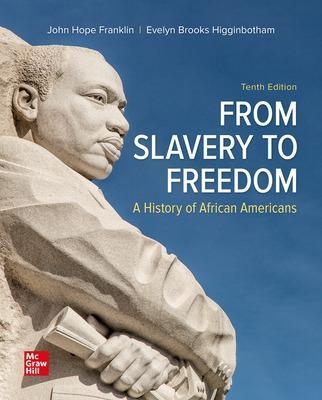
From Slavery to Freedom
McGraw-Hill Inc.,US (Verlag)
978-0-07-351334-8 (ISBN)
Since its first edition in 1947, From Slavery to Freedom: A History of African Americans has inserted the black experience squarely into American history—a narrative that previously denied black contribution or at best dismissed its importance. An ever-growing mountain of scholarship on African Americans informs the book’s discussion of several topics, from the development of metallurgy in ancient African civilizations to the story of black life in the British colonies to the emergence of social movements and activism in communities across the United States in the mid-twentieth century. This edition of From Slavery to Freedom also incorporates new historical actors, including the role of women throughout history, particularly in slavery, abolitionism, the Jim Crow era, and the civil rights/black power movement.
John Hope Franklin was the James B. Duke Professor Emeritus of History, and for seven years was Professor of Legal History at Duke University Law School. A native of Oklahoma and a graduate of Fisk University (1935), he received the A.M. and Ph.D. degrees in history from Harvard University (1936 and 1941). He taught at a number of institutions, including Fisk, St. Augustines College, and Howard University. In 1956 he went to Brooklyn College as Chair of the Department of History; and in 1964, he joined the faculty of the University of Chicago, serving as Chair of the Department of History from 1967 to 1970. At Chicago, he was the John Matthews Manly Distinguished Service Professor from 1969 to 1982, when he became Professor Emeritus.Among his many published works are The Free Negro in North Carolina (1943), Reconstruction after the Civil War (1961), A Southern Odyssey (1971), and perhaps his best-known book, From Slavery to Freedom: A History of African Americans, now in its ninth edition. In 1990 a collection of essays covering a teaching and writing career of fifty years was published as Race and History: Selected Essays, 1938-1988. At the time of his death in March 2009, he was engaged in research on "Dissidents on the Plantation: Runaway Slaves."During his long career, Professor Franklin was active in numerous professional and educational organizations. For many years he served on the editorial board of the Journal of Negro History. He also served as president of the following organizations:The Southern Historical Association, the United Chapters of Phi Beta Kappa, the Organization of American Historians, and the American Historical Association.Dr. Franklin served on many national commissions and delegations, including the National Council on the Humanities, the President's Advisory Commission on Ambassadorial Appointments, and the United States delegation to the 21st General Conference of UNESCO. He was appointed by President Clinton to chair the President's Advisory Board for the One America initiative in June 1997.He was the recipient of many honors. In 1978 Who's Who in America selected him as one of eight Americans who has made significant contributions to society. In 1995 he received the first W.E.B. DuBois Award from the Fisk University Alumni Association, the Organization of American Historians' Award for Outstanding Achievement, the NAACP's Spingarn medal, and the Presidential Medal of Freedom. In addition to his many awards, Dr. Franklin received honorary degrees from more than one hundred colleges and universities. Evelyn Brooks Higginbotham is the Victor S. Thomas Professor of History and of African and African American Studies at Harvard University. She is currently chair of the Department of African and African American Studies and has held this position since 2006. Professor Higginbotham earned a Ph.D. from the University of Rochester in American History, an M.A. from Howard University, and her B.A. from the University of Wisconsin-Milwaukee. Before coming to Harvard, she taught on the full-time faculties of Dartmouth, the University of Maryland, and the University of Pennsylvania. In addition, she was a Visiting Professor at Princeton University and New York University.Professor Higginbotham's writings span diverse fields--African American religious history, women's history, civil rights, constructions of racial and gender identity, electoral politics, and the intersection of theory and history. She is co-editor with Henry Louis Gates, Jr., of the African American National Biography (2008)--a multivolume-reference work that presents African American history through the lives of people. Professor Higginbotham is the author of Righteous Discontent: The Women's Movement in the Black Baptist Church: 1880-1920 (1993), which won numerous book prizes and was also included among The New York Times Book Review's Notable Books of the Year in 1993 and 1994. Dr. Higginbotham has received numerous awards. In April 2003 she was chosen by Harvard University to be a Walter Channing Cabot Fellow in recognition of her achievements and scholarly eminence in the field of history. The Association for the Study of African American Life and History awarded her the Carter G. Woodson Scholars Medallion in October 2008, and the Urban League awarded her the Legend Award in August 2008.
From Slavery to Freedom, 10e
CHAPTER 1: Ancestral Africa (circa 500 B.C.E to 1600)
CHAPTER 2: Africans in the Atlantic World (1492–1800)
CHAPTER 3: Establishing North American Slavery (1520s to 1720s)
CHAPTER 4: Eighteenth-Century Slave Societies (1700–1780s)
CHAPTER 5: Give Me Liberty (1763–1787)
CHAPTER 6: Building Communities in the Early Republic (1790–1830)
CHAPTER 7: Southern Slavery (1790–1860)
CHAPTER 8: Antebellum Free Blacks (1830–1860)
CHAPTER 9: Abolitionism in Black and White (1820–1860)
CHAPTER 10: Civil War (1861–1865)
CHAPTER 11: Promises and Pitfalls of Reconstruction (1863–1877)
CHAPTER 12: The Color Line (1877–1917)
CHAPTER 13: The Era of Self-Help (1880–1916)
CHAPTER 14: In Pursuit of Democracy (1914–1919)
CHAPTER 15: Voices of Protest (1910–1928)
CHAPTER 16: The Arts at Home and Abroad (1920s to early 1930s)
CHAPTER 17: The New Deal Era (1929–1941)
CHAPTER 18: Double V for Victory (1941–1945)
CHAPTER 19: American Dilemmas (1940–1955)
CHAPTER 20: We Shall Overcome (1947–1967)
CHAPTER 21: Black Power (1955–1980)
CHAPTER 22: Progress and Poverty (1980–2000)
CHAPTER 23: Shifting Terrains in the New Century
| Erscheinungsdatum | 06.01.2018 |
|---|---|
| Zusatzinfo | Illustrations, unspecified |
| Verlagsort | New York |
| Sprache | englisch |
| Gewicht | 1490 g |
| Themenwelt | Geisteswissenschaften ► Geschichte ► Regional- / Ländergeschichte |
| ISBN-10 | 0-07-351334-2 / 0073513342 |
| ISBN-13 | 978-0-07-351334-8 / 9780073513348 |
| Zustand | Neuware |
| Haben Sie eine Frage zum Produkt? |
aus dem Bereich


